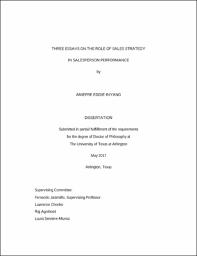
ATTENTION: The works hosted here are being migrated to a new repository that will consolidate resources, improve discoverability, and better show UTA's research impact on the global community. We will update authors as the migration progresses. Please see MavMatrix for more information.
Show simple item record
| dc.contributor.advisor | Jaramillo, Fernando | |
| dc.creator | Inyang, Eddie | |
| dc.date.accessioned | 2019-07-09T23:28:21Z | |
| dc.date.available | 2019-07-09T23:28:21Z | |
| dc.date.created | 2017-05 | |
| dc.date.issued | 2017-04-05 | |
| dc.date.submitted | May 2017 | |
| dc.identifier.uri | http://hdl.handle.net/10106/28334 | |
| dc.description.abstract | The importance of the sales force to implementing organizational strategy has been widely acknowledged in both the academic and practitioner literature. With organizations spending over $800 billion a year on their sales forces, when the activities of the sales force become uncoupled from organizational strategy, it results in direct and indirect costs to the firm. Despite the importance of the sales force to implementing organizational strategy, there have been scant empirical studies in the academic literature on the role of salespeople in implementing strategy. In this dissertation, three essays examine the performance outcomes of salesperson implementation of sales strategy, along with issue of how the sales force can be aligned with organizational strategy. Essay one explores salesperson understanding of firm strategy, and how salespeople incorporate strategy into their day-to-day activities using a qualitative approach. Prior research indicates that most employees do not have an understanding of their organization’s strategy, and this lack of employee knowledge hampers employee ability to implement strategy. Using MOA theory as a theoretical base, essay two develops and tests a model of managerial and individual drivers of salesperson implementation of strategy. The findings show managerial control has contrasting effects on salesperson implementation of strategy, while both individual level factors have positive effects on salesperson implementation of strategy. The results suggest the MOA variables jointly affect strategy implementation by salespeople, and when salespeople implement strategy, it has a positive effect on their sales performance. Finally, the third essay examine the effectiveness of transformational and transactional leadership styles on influencing salespeople to implement strategy. Essay three also incorporates a contingency variable to evaluate how the effectiveness of a particular leadership on salesperson implementation of strategy can vary when the external environment is taken into account. | |
| dc.format.mimetype | application/pdf | |
| dc.language.iso | en_US | |
| dc.subject | Salesperson | |
| dc.subject | Sales strategy | |
| dc.subject | Strategy implementation | |
| dc.subject | Sales force | |
| dc.subject | Sales performance | |
| dc.title | Three Essays on the Role of Sales Strategy in Salesperson Performance | |
| dc.type | Thesis | |
| dc.degree.department | Marketing | |
| dc.degree.name | Doctor of Philosophy in Marketing | |
| dc.date.updated | 2019-07-09T23:28:21Z | |
| thesis.degree.department | Marketing | |
| thesis.degree.grantor | The University of Texas at Arlington | |
| thesis.degree.level | Doctoral | |
| thesis.degree.name | Doctor of Philosophy in Marketing | |
| dc.type.material | text | |
Files in this item
- Name:
- INYANG-DISSERTATION-2017.pdf
- Size:
- 1.303Mb
- Format:
- PDF
This item appears in the following Collection(s)
Show simple item record


